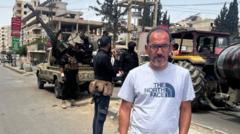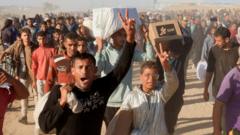On the morning of May 9, a seven-member team from BBC Arabic, including myself, departed from Damascus heading towards the southern province of Deraa, intending to report on the Israeli-occupied Golan Heights. This area has been under Israeli control since December, prompted by ongoing conflicts in the region due to the collapse of Bashar al-Assad’s regime.
While filming near a UN Disengagement Observer Force (UNDOF) observation post in al-Rafeed, we were informed by a UN official that Israeli forces had been made aware of our presence. As we moved north toward Quneitra, located within the buffer zone established by a 1974 agreement, we encountered an unguarded checkpoint; Israeli tanks and soldiers were visibly positioned nearby.
A few moments into our filming, a white car, identifying itself as Israeli military, approached. Four soldiers exited and quickly surrounded us, aiming their rifles in a show of force. Despite my attempts to explain our purpose as a BBC news crew, tensions escalated rapidly. I managed to alert my BBC colleagues in London about our predicament before Israeli soldiers confiscated our phones and equipment and began a thorough search of our vehicle.
After escorting us into Quneitra, the soldiers insisted on reviewing our footage while I was held at gunpoint inside our car. Following an hour of tension, I was taken aside to speak with an individual on the phone, who questioned my motives for filming military positions. The interrogation deepened as more soldiers arrived, with one officer asserting that he wouldn’t blindfold or handcuff me for my "cooperation."
The situation worsened when I was ordered to strip down to my underwear for a thorough search, amidst threats of further consequences if we attempted to approach the border again. My teammates were subsequently interrogated and strip-searched while being restrained. The officers deleted personal photos from our devices and warned us about future encounters with the military.
After enduring seven hours of intimidation, the soldiers finally transported us away from Quneitra, discarding our belongings near a rural area. Lost and without connectivity, we navigated our way back with the help of local villagers who directed us toward safety. This harrowing experience underscores the significant risks journalists face in conflict zones, where information can quickly spark dangerous confrontations.





















